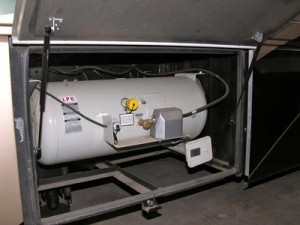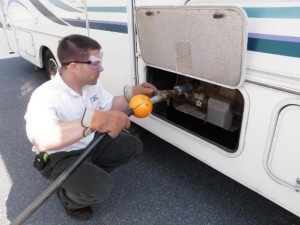This article, related to the inspection of propane systems on recreational vehicles first appeared in the 2016 Jan/Feb edition of Propane Canada Magazine.
In recent articles, I have mentioned that the province of Ontario is in the process of developing Code Adoption Documents (CAD) that would amend and adopt the 2015 B149 series of codes. One of the new requirements is the inspection of propane systems installed on Recreational Vehicles (RVs) equipped with a permanently mounted propane tank.
Inspection of Recreational Vehicles in Ontario
 Proposed revisions in the Ontario 2016 Propane Code Adoption Document will require RVs equipped with permanently mounted propane tanks to have the pro-pane appliances, propane piping system and tank inspected on a five-year cycle. An RV that successfully passes the inspection process will be affixed with two labels to identify that the unit is acceptable to the Authority Having Jurisdiction (AHJ) for the onboard propane tank to be filled.
Proposed revisions in the Ontario 2016 Propane Code Adoption Document will require RVs equipped with permanently mounted propane tanks to have the pro-pane appliances, propane piping system and tank inspected on a five-year cycle. An RV that successfully passes the inspection process will be affixed with two labels to identify that the unit is acceptable to the Authority Having Jurisdiction (AHJ) for the onboard propane tank to be filled.
The RVs in question are actually motorhomes, as these are the only RVs that have permanently mounted propane tanks. Other RVs are towed vehicles that use propane cylinders to supply fuel to the propane appliances installed in the units. The only difference with respect to the propane systems on board between the motorhomes and towed RVs is the actual propane container; the piping systems and appliances are installed in accordance with the CSA standard regardless of whether the unit is self-propelled or towed.
Inspection Process
 To obtain the two labels a motorhome owner will have to take the unit to an RV dealer, propane supply or heating contractor who has the staff with the appropriate propane certificates to inspect the appliances and piping system and issue a certificate indicating the appliances and piping system are acceptable. Then, the owner must take the unit to a Technical Standards & Safety Authority (TSSA) Registered Conversion Inspection Facility to have the tank inspected by a person with an ICE certificate. The Registered Conversion Centres will be the only ones able to obtain and affix the two labels required directly from TSSA.
To obtain the two labels a motorhome owner will have to take the unit to an RV dealer, propane supply or heating contractor who has the staff with the appropriate propane certificates to inspect the appliances and piping system and issue a certificate indicating the appliances and piping system are acceptable. Then, the owner must take the unit to a Technical Standards & Safety Authority (TSSA) Registered Conversion Inspection Facility to have the tank inspected by a person with an ICE certificate. The Registered Conversion Centres will be the only ones able to obtain and affix the two labels required directly from TSSA.
To provide some perspective on the magnitude of the inspection requirement, there are currently over 25,000 licensed motorhomes in the province of Ontario. If the requirements in the CAD are adopted, each motorhome will require 2 inspections, by different service providers, so that the owners can have affixed the labels that will permit the propane filling attendant to fill the propane tank. This works out to a total of 50,000 inspections.
There is also a question with respect to new motorhomes sitting unsold on dealer lots. Unless the dealer puts the motorhome through the inspection process, these brand-new units at the time of sale will not have the two propane labels required in order for the propane tank to be filled. This means that the first thing the new owner must do is arrange for his/her brand-new unused unit to go through the 2-part inspection process in order to obtain the necessary labels.
Rationale and Risk
I suspect that one of the drivers for the inspection of the propane tanks on RVs may be the requirements for the inspection of tanks and fuel systems on converted vehicles where propane is used as an engine fuel. Vehicles converted to run on propane are usually fleet type vehicles such as taxis, limousines, and delivery which are on the road every day 365 days a year regardless of the weather conditions. Conversely RVs are usually limited to summer use and in the winter are relocated to the southern climates where snow or ice and salt does not have the same impact on exposed propane tanks.
If there is a need, risk or safety driven, to inspect the propane piping and appliances on a motorhome, one must ask, why would these requirements not apply to a towed RV as these vehicles operate in the same outdoor environment? While I can appreciate that the owner of a towed RV can remove the propane cylinders and the filling attendant may or may not see the RV, reducing control for compliance, the inspection requirements of the propane piping system and appliances on motorhomes creates an uneven playing field between an RV that is self-propelled and one that is towed.
If the risk is the corrosion and failure of the permanently mounted exposed propane tank, then it would make sense to look to the inspection of the tank only, say on a 10-year cycle, which would, in essence, parallel the propane container inspection required for propane cylinders installed on towed RVs.
The current inspection model being promoted in Ontario is risk-based where the assessed risk drives the frequency of inspection. While there certainly have been incidents in the past with the propane systems and appliances installed on RVs, we have no sense of the frequency nor have we seen any data to indicate the risk to the general public warrants the inspection the propane systems and appliances on a regular basis.
Barriers to Compliance
I did a considerable amount of research, on the TSSA website, Yellow Pages, 411 and speaking with people in the industry in an attempt to identify the number of TSSA Registered Conversion Centres that could perform the propane tank inspection and affix the two labels. My best guesstimate is less than 25 such facilities that are primarily located around the Golden horseshoe. Two facilities were located in Sault Ste. Marie. My research failed to identify whether all of these facilities could accommodate the inspection of propane tanks on large motorhomes.
For example, I was told that Canada Post has a registered conversion centre which is used strictly for their own vehicles and would therefore not be available to inspect propane tanks on motorhomes. My question is, if I had trouble finding the location and number of registered conversion centres, how would one expect a motorhome owner to find this information.
Given the limited number of inspection facilities, their geographic locations, and the sheer number of motorhomes to be inspected the proposed requirements will create a substantial barrier to compliance. This will disadvantage the motorhome industry in Ontario and could very well deter the consumer from purchasing a motorhome to be licensed in the province.
In addition, propane filling attendants in Ontario will require training to identify and recognize the new label requirements.
Out of Province RVs
 The requirements will also need to address out-of-province or out-of-country motorhomes that can either be vacationing in Ontario or travelling through. How will these owners get propane if they do not have the necessary labels attached to the vehicle? The propane fill attendants are instructed not to fill any propane tanks on vehicles unless the vehicle has the appropriate labels displayed to show that it meets the requirements for the province of Ontario.
The requirements will also need to address out-of-province or out-of-country motorhomes that can either be vacationing in Ontario or travelling through. How will these owners get propane if they do not have the necessary labels attached to the vehicle? The propane fill attendants are instructed not to fill any propane tanks on vehicles unless the vehicle has the appropriate labels displayed to show that it meets the requirements for the province of Ontario.
Action Being Taken
I have been retained to assist the Ontario RV Dealers Association in an effort to address the issues identified. A letter outlining the issues has been sent to the chair of TSSA’s Propane Risk Reduction Group. At the time of writing this article, we are awaiting a response.

